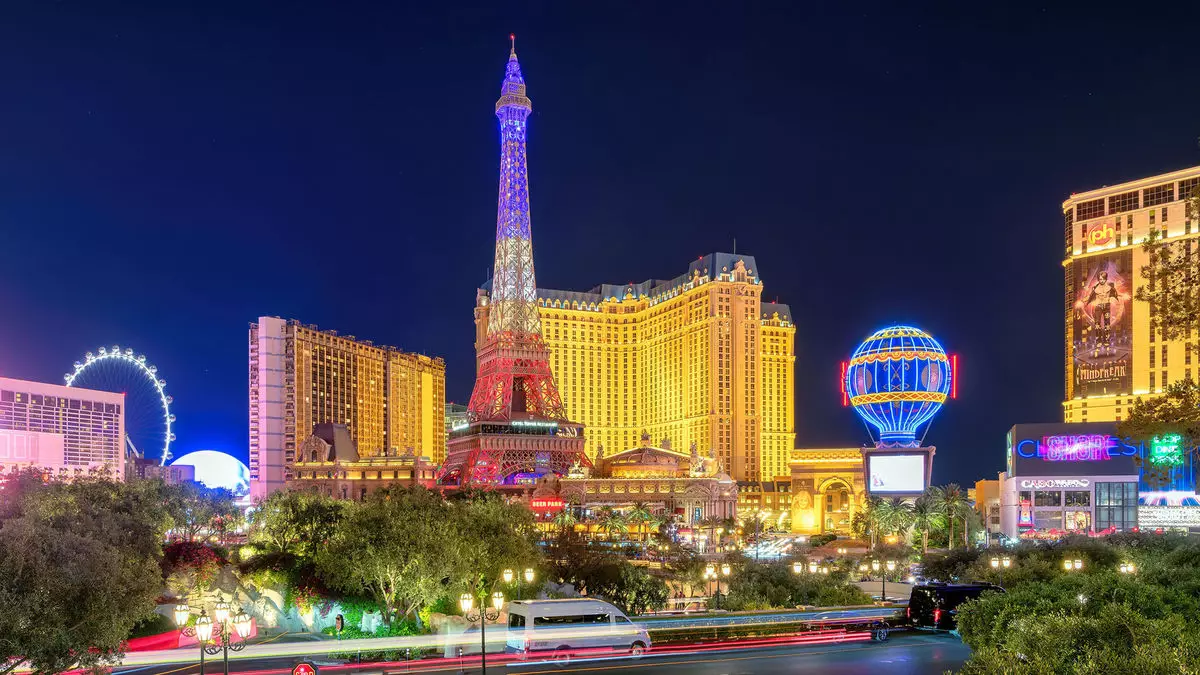Las Vegas, long celebrated as the entertainment capital of the world, is experiencing one of its most challenging periods in recent history. Traditionally buoyed by a steady influx of international visitors, major events, and a resilient hospitality industry, the city now grapples with a steep decline in its hotel performance metrics. Preliminary industry data reveals a staggering 14.9% drop in occupancy for June, coupled with a 16.8% decrease in July, and a jaw-dropping 28.7% decline in revenue per available room (RevPAR). These figures are not merely statistical blips; they represent a fundamental shift in the tourism landscape that threatens to redefine the city’s economic fabric.
The sharp downturn is largely attributable to weakened international visitation, especially from Canada, alongside broader macroeconomic uncertainty that is deterring leisure travelers. The Las Vegas Convention and Visitors Authority (LVCVA) reported a 6.5% decline in visitor volume in May, a clear indicator that the city’s once robust tourism engine is sputtering. This decline is particularly problematic because it hampers the city’s ability to sustain its pivotal hospitality and service sectors, which rely heavily on both domestic and international visitors.
Unraveling the Causes: Economy, International Dynamics, and Consumer Confidence
Several intertwined factors contribute to Las Vegas’s current difficulties. Foremost among these is the global economic climate, which has fostered a climate of caution among consumers. With persistent inflation, rising interest rates, and economic unpredictability, consumers—both domestic and international—are less willing to spend on leisure activities. Steve Hill, CEO of LVCVA, emphasizes that this is a “national phenomenon” rather than a localized issue. When tourism demand dips, it is often a reflection of broader economic malaise that no amount of marketing can quickly reverse.
Simultaneously, international travel restrictions and geopolitical factors continue to suppress overseas visitation, especially from Canada. Data indicates a consistent decline in international arrivals throughout 2025, with a particularly sharp 13.2% drop in June. This international component has historically been a vital revenue driver for Las Vegas; without it, the city’s vibrant nightlife, shows, and casino floors feel the sting. The fact that only January showed growth in overseas arrivals underscores how fragile the international tourism recovery remains.
Some industry analysts attribute these trends to natural seasonal fluctuations; however, the scale and persistence of declines suggest deeper structural issues. As John DeCree of CBRE points out, the market is returning to typical seasonal patterns after an unprecedented period of excess demand. But it would be naive to dismiss these declines as merely cyclical. Instead, they spotlight vulnerabilities that the city must confront head-on.
Strategic Responses: Reinvention and Value-Centric Campaigns
Las Vegas’s response to these challenges has been both aggressive and innovative. Recognizing that traditional marketing efforts alone may no longer suffice, the city’s hospitality industry and tourism authorities have ramped up their marketing spend, with the LVCVA allocating an unprecedented 30% increase in the annual marketing budget. Their messaging pivots around affordability, emphasizing that “Las Vegas has an offering for every budget,” a direct acknowledgment of consumers’ financial apprehensions.
Hotels and resorts are leading the charge with distinctive promotional strategies designed to attract both new and returning visitors. Resorts World Las Vegas, for example, introduced an “All Resort, No Fees” package—eliminating resort fees and offering complimentary parking and nightly credits. This initiative is precisely targeted at locals and budget-conscious travelers who are hesitant to spend amid economic uncertainty but still seek the Vegas experience.
Other properties have adopted tiered value offers—such as Caesars’ discounts on rooms, dining, and attractions, while the Sahara Las Vegas provides options to waive resort fees or receive dining credits. The Strat’s midweek and weekend deals, alongside Circa’s all-inclusive summer package, exemplify how properties are diversifying their offerings to remain competitive. These tactics tap into the core of consumer psychology: value, convenience, and flexibility.
Of particular note is the strategic shift toward daytime revenue generation. By expanding programming with “power lunch” menus, happy hours, and pool day passes, resorts are capitalizing on hospitality’s non-gaming segments. This diversification aims to buffer the financial impact of reduced gaming revenues and international tourism.
Looking Forward: Resilience, Innovation, and the Unpredictable Road Ahead
Despite the current turbulence, industry insiders retain a cautiously optimistic outlook for the latter part of the year. The strong schedule of trade shows, conventions, and events from September onward offers a silver lining, suggesting that the city’s economy will remain resilient through diversification. The recent uptick in conference attendance is particularly promising, hinting that business tourism might hold the key to stabilizing revenue streams as leisure tourism remains subdued.
This adaptive approach—combining targeted marketing, innovative packages, and a focus on value—demonstrates a crucial lesson: Las Vegas’s true strength lies not just in its glitz and glamour but in its capacity to innovate under pressure. The city’s recognition that it must evolve to meet shifting consumer behaviors is encouraging, even as the industry contends with headwinds from a fragile global economy.
The key question remains whether these strategies are sufficient to usher Vegas through this turbulent chapter. If the city can sustain its investment in adaptable, customer-centric offerings and capitalize on its resilience, it has the potential to emerge stronger than before. However, the path forward is fraught with uncertainties—geopolitical shifts, health crises, and economic swings—that will continually test Vegas’s famed adaptability. But if history is any guide, Las Vegas’s indomitable spirit and willingness to innovate will ensure it remains a beacon of resilience for years to come.


Leave a Reply